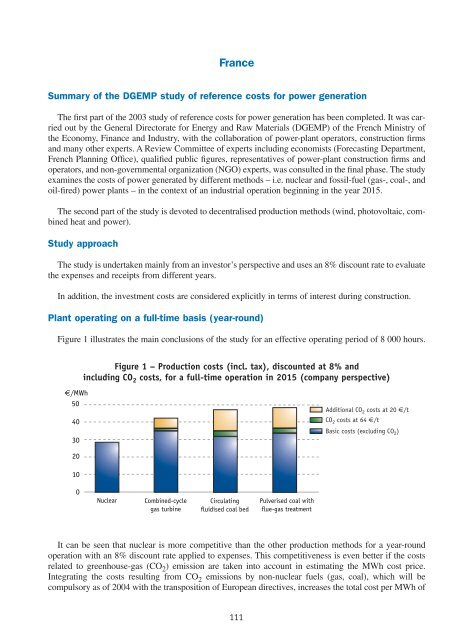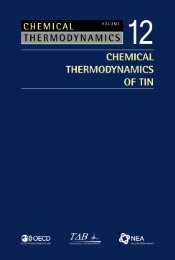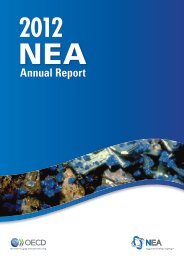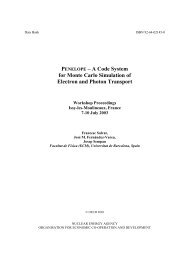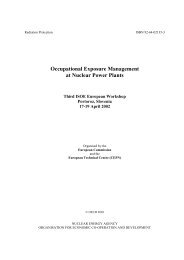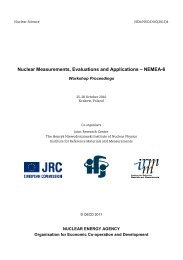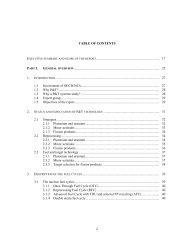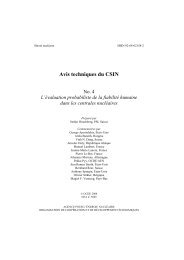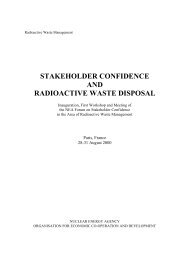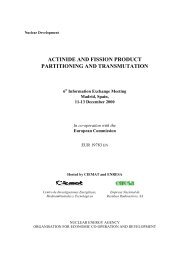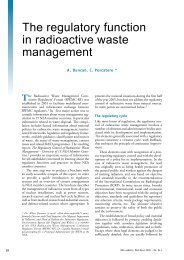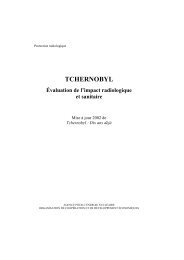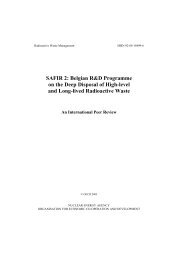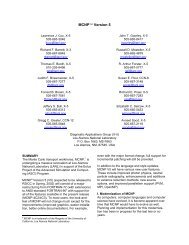Projected Costs of Generating Electricity - OECD Nuclear Energy ...
Projected Costs of Generating Electricity - OECD Nuclear Energy ...
Projected Costs of Generating Electricity - OECD Nuclear Energy ...
Create successful ePaper yourself
Turn your PDF publications into a flip-book with our unique Google optimized e-Paper software.
France<br />
Summary <strong>of</strong> the DGEMP study <strong>of</strong> reference costs for power generation<br />
The first part <strong>of</strong> the 2003 study <strong>of</strong> reference costs for power generation has been completed. It was carried<br />
out by the General Directorate for <strong>Energy</strong> and Raw Materials (DGEMP) <strong>of</strong> the French Ministry <strong>of</strong><br />
the Economy, Finance and Industry, with the collaboration <strong>of</strong> power-plant operators, construction firms<br />
and many other experts. A Review Committee <strong>of</strong> experts including economists (Forecasting Department,<br />
French Planning Office), qualified public figures, representatives <strong>of</strong> power-plant construction firms and<br />
operators, and non-governmental organization (NGO) experts, was consulted in the final phase. The study<br />
examines the costs <strong>of</strong> power generated by different methods – i.e. nuclear and fossil-fuel (gas-, coal-, and<br />
oil-fired) power plants – in the context <strong>of</strong> an industrial operation beginning in the year 2015.<br />
The second part <strong>of</strong> the study is devoted to decentralised production methods (wind, photovoltaic, combined<br />
heat and power).<br />
Study approach<br />
The study is undertaken mainly from an investor’s perspective and uses an 8% discount rate to evaluate<br />
the expenses and receipts from different years.<br />
In addition, the investment costs are considered explicitly in terms <strong>of</strong> interest during construction.<br />
Plant operating on a full-time basis (year-round)<br />
Figure 1 illustrates the main conclusions <strong>of</strong> the study for an effective operating period <strong>of</strong> 8 000 hours.<br />
Figure 1 – Production costs (incl. tax), discounted at 8% and<br />
including CO 2 costs, for a full-time operation in 2015 (company perspective)<br />
€/MWh<br />
50<br />
40<br />
30<br />
Additional CO 2 costs at 20 €/t<br />
CO 2 costs at 64 €/t<br />
Basic costs (excluding CO 2 )<br />
20<br />
10<br />
0<br />
<strong>Nuclear</strong> Combined-cycle<br />
gas turbine<br />
Circulating<br />
fluidised coal bed<br />
Pulverised coal with<br />
flue-gas treatment<br />
It can be seen that nuclear is more competitive than the other production methods for a year-round<br />
operation with an 8% discount rate applied to expenses. This competitiveness is even better if the costs<br />
related to greenhouse-gas (CO 2 ) emission are taken into account in estimating the MWh cost price.<br />
Integrating the costs resulting from CO 2 emissions by non-nuclear fuels (gas, coal), which will be<br />
compulsory as <strong>of</strong> 2004 with the transposition <strong>of</strong> European directives, increases the total cost per MWh <strong>of</strong><br />
111


